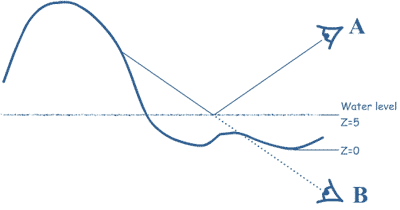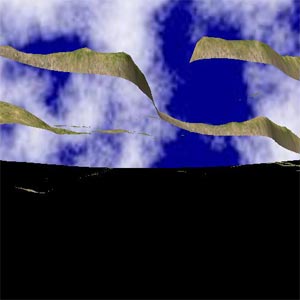3D系列4.9 绘制反射贴图
上一章我们学习了如何设置一个用户剪裁平面,如何将平面之下的场景绘制到纹理中。本章,我们将使用同样的技术将反射贴图绘制到纹理中。水面的所有像素需要这个贴图获取反射颜色。
我们需要另一张纹理,所以定义以下变量:
RenderTarget2D reflectionRenderTarg; Texture2D reflectionMap;
在LoadContent方法中进行初始化:
reflectionRenderTarget = new RenderTarget2D(device, pp.BackBufferWidth, pp.BackBufferHeight, 1, device.DisplayMode.Format);
现在讨论一下如何将反射绘制到纹理中。有一件事可以肯定:我们需要重新定位相机,因为我们想通过水面观察场景。我们只需知道相机的位置和它观察的目标。
相机的位置是这样确定的,X和Z的坐标相同,而Y坐标关于水面镜像,看一下下图:

对水面的每个像素,从相机A看到的颜色与从相机B看到的颜色相同。这意味着要知道水面的反射颜色,我们必须将从相机B中看到的场景绘制到一张纹理中。
还有一个问题:如上图所示,水面之下的地形遮挡了相机的视线。这意味着相机B只会绘制地形的底部!因此,我们需要剪裁地形在水面之下的部分。幸运的是,我们已经在上一章中知道如何处理了。
但首先,让我们定义相机B的矩阵,在项目中添加以下代码:
Matrix reflectionViewMatrix;
在UpdateViewMatrix方法中计算这个矩阵。要定义一个相机矩阵,我们需要位置、目标和向上向量。
我们已经知道了位置:相机B的X和Z坐标与相机A相同,相机A和水面间的Y坐标和相机B与水面间的Y坐标相同。所以添加以下代码:
Vector3 reflCameraPosition = cameraPosition;
reflCameraPosition.Y = -cameraPosition.Y + waterHeight * 2;
获取相机B的观察目标方法类似:
Vector3 reflTargetPos = cameraFinalTarget;
reflTargetPos.Y = -cameraFinalTarget.Y + waterHeight * 2;
现在我们还需定义Up向量。需要使用叉乘,两个向量叉乘的结果是一个垂直于这两个向量的向量。所以,如果我们叉乘相机B的向前向量和向右向量,就获取了相机B的向上向量。下面是代码:
Vector3 cameraRight = Vector3.Transform(new Vector3(1, 0, 0), cameraRotation); Vector3 invUpVector = Vector3.Cross(cameraRight, reflTargetPos - reflCameraPosition);
现在有了相机B的位置、观察目标和向上向量,就可以定义视矩阵了:
reflectionViewMatrix = Matrix.CreateLookAt(reflCameraPosition, reflTargetPos, invUpVector);
定义了相机B的视矩阵,就可以定义DrawReflectionMap方法了,在这个方法中,我们首先定义剪裁平面。下面的代码来自于上一章:
private void DrawReflectionMap()
{
Plane reflectionPlane = CreatePlane(waterHeight - 0.5f, new Vector3(0,-1,0), reflectionViewMatrix, true);
device.ClipPlanes[0].Plane = reflectionPlane;
device.ClipPlanes[0].IsEnabled = true;
device.SetRenderTarget(0, reflectionRenderTarget);
device.Clear(ClearOptions.Target | ClearOptions.DepthBuffer, Color.Black, 1.0f, 0);
DrawTerrain(reflectionViewMatrix);
DrawSkyDome(reflectionViewMatrix);
device.ClipPlanes[0].IsEnabled = false;

device.SetRenderTarget(0, null);
reflectionMap = reflectionRenderTarget.GetTexture();
}
第一行代码创建一个和上一章同样的平面,但是另两个参数不同:我们需要传递B相机的视矩阵,表示这次我们只想绘制剪裁平面之上的部分。
然后,激活剪裁平面和显卡上的渲染目标并清除它。之后绘制地形和天空球。这次我们传递的是reflectionViewMatrix,因为我们需要从相机B观察地形和天空!
别忘了在Draw方法中调用这个方法:
DrawReflectionMap();
现在添加以下代码:
reflectionMap.Save("refr.jpg", ImageFileFormat.Jpg);
你就可以在ref.jpg文件中看到结果:

结果看起来有点奇怪:相机A看到的每个像素,都会在这个贴图中找到反射颜色。下一章我们会开始使用这些贴图!
下面是XNA代码,红色部分为相对于上一章增加的代码:
using System;
using System.Collections.Generic;
using Microsoft.Xna.Framework;
using Microsoft.Xna.Framework.Audio;
using Microsoft.Xna.Framework.Content;
using Microsoft.Xna.Framework.GamerServices;
using Microsoft.Xna.Framework.Graphics;
using Microsoft.Xna.Framework.Input;
using Microsoft.Xna.Framework.Net;
using Microsoft.Xna.Framework.Storage;

namespace XNAseries4
{
public struct VertexMultitextured
{
public Vector3 Position;
public Vector3 Normal;
public Vector4 TextureCoordinate;
public Vector4 TexWeights;

public static int SizeInBytes = (3 + 3 + 4 + 4) * sizeof(float);
public static VertexElement[] VertexElements = new VertexElement[]
{
new VertexElement( 0, 0, VertexElementFormat.Vector3, VertexElementMethod.Default, VertexElementUsage.Position, 0 ),
new VertexElement( 0, sizeof(float) * 3, VertexElementFormat.Vector3, VertexElementMethod.Default, VertexElementUsage.Normal, 0 ),
new VertexElement( 0, sizeof(float) * 6, VertexElementFormat.Vector4, VertexElementMethod.Default, VertexElementUsage.TextureCoordinate, 0 ),
new VertexElement( 0, sizeof(float) * 10, VertexElementFormat.Vector4, VertexElementMethod.Default, VertexElementUsage.TextureCoordinate, 1 ),
};
}

public class Game1 : Microsoft.Xna.Framework.Game
{
GraphicsDeviceManager graphics;
GraphicsDevice device;

int terrainWidth;
int terrainLength;
float[,] heightData;

VertexBuffer terrainVertexBuffer;
IndexBuffer terrainIndexBuffer;
VertexDeclaration terrainVertexDeclaration;

Effect effect;
Matrix viewMatrix;
Matrix projectionMatrix;
Matrix reflectionViewMatrix;

Vector3 cameraPosition = new Vector3(130, 30, -50);
float leftrightRot = MathHelper.PiOver2;
float updownRot = -MathHelper.Pi / 10.0f;
const float rotationSpeed = 0.3f;
const float moveSpeed = 30.0f;
MouseState originalMouseState;

Texture2D grassTexture;
Texture2D sandTexture;
Texture2D rockTexture;
Texture2D snowTexture;
Texture2D cloudMap;

Model skyDome;

const float waterHeight = 5.0f;
RenderTarget2D refractionRenderTarget;
Texture2D refractionMap;
RenderTarget2D reflectionRenderTarget;
Texture2D reflectionMap;

public Game1()
{
graphics = new GraphicsDeviceManager(this);
Content.RootDirectory = "Content";
}

protected override void Initialize()
{
graphics.PreferredBackBufferWidth = 500;
graphics.PreferredBackBufferHeight = 500;

graphics.ApplyChanges();
Window.Title = "Riemer's XNA Tutorials -- Series 4";

base.Initialize();
}

protected override void LoadContent()
{
device = GraphicsDevice;

effect = Content.Load<Effect> ("Series4Effects");
UpdateViewMatrix();
projectionMatrix = Matrix.CreatePerspectiveFieldOfView(MathHelper.PiOver4, device.Viewport.AspectRatio, 0.3f, 1000.0f);

Mouse.SetPosition(device.Viewport.Width / 2, device.Viewport.Height / 2);
originalMouseState = Mouse.GetState();


skyDome = Content.Load<Model> ("dome"); skyDome.Meshes[0].MeshParts[0].Effect = effect.Clone(device);

PresentationParameters pp = device.PresentationParameters;
refractionRenderTarget = new RenderTarget2D(device, pp.BackBufferWidth, pp.BackBufferHeight, 1, device.DisplayMode.Format);

reflectionRenderTarget = new RenderTarget2D(device, pp.BackBufferWidth, pp.BackBufferHeight, 1, device.DisplayMode.Format);

LoadVertices();
LoadTextures();
}

private void LoadVertices()
{

Texture2D heightMap = Content.Load<Texture2D> ("heightmap"); LoadHeightData(heightMap);

VertexMultitextured[] terrainVertices = SetUpTerrainVertices();
int[] terrainIndices = SetUpTerrainIndices();
terrainVertices = CalculateNormals(terrainVertices, terrainIndices);
CopyToTerrainBuffers(terrainVertices, terrainIndices);
terrainVertexDeclaration = new VertexDeclaration(device, VertexMultitextured.VertexElements);
}

private void LoadTextures()
{

grassTexture = Content.Load<Texture2D> ("grass");
sandTexture = Content.Load<Texture2D> ("sand");
rockTexture = Content.Load<Texture2D> ("rock");
snowTexture = Content.Load<Texture2D> ("snow");
cloudMap = Content.Load<Texture2D> ("cloudMap"); }

private void LoadHeightData(Texture2D heightMap)
{
float minimumHeight = float.MaxValue;
float maximumHeight = float.MinValue;

terrainWidth = heightMap.Width;
terrainLength = heightMap.Height;

Color[] heightMapColors = new Color[terrainWidth * terrainLength];
heightMap.GetData(heightMapColors);

heightData = new float[terrainWidth, terrainLength];
for (int x = 0; x < terrainWidth; x++)
for (int y = 0; y < terrainLength; y++)
{
heightData[x, y] = heightMapColors[x + y * terrainWidth].R;
if (heightData[x, y] < minimumHeight) minimumHeight = heightData[x, y];
if (heightData[x, y] > maximumHeight) maximumHeight = heightData[x, y];
}

for (int x = 0; x < terrainWidth; x++)
for (int y = 0; y < terrainLength; y++)
heightData[x, y] = (heightData[x, y] - minimumHeight) / (maximumHeight - minimumHeight) * 30.0f;
}

private VertexMultitextured[] SetUpTerrainVertices()
{
VertexMultitextured[] terrainVertices = new VertexMultitextured[terrainWidth * terrainLength];

for (int x = 0; x < terrainWidth; x++)
{
for (int y = 0; y < terrainLength; y++)
{
terrainVertices[x + y * terrainWidth].Position = new Vector3(x, heightData[x, y], -y);
terrainVertices[x + y * terrainWidth].TextureCoordinate.X = (float)x / 30.0f;
terrainVertices[x + y * terrainWidth].TextureCoordinate.Y = (float)y / 30.0f;

terrainVertices[x + y * terrainWidth].TexWeights.X = MathHelper.Clamp(1.0f - Math.Abs(heightData[x, y] - 0) / 8.0f, 0, 1);
terrainVertices[x + y * terrainWidth].TexWeights.Y = MathHelper.Clamp(1.0f - Math.Abs(heightData[x, y] - 12) / 6.0f, 0, 1);
terrainVertices[x + y * terrainWidth].TexWeights.Z = MathHelper.Clamp(1.0f - Math.Abs(heightData[x, y] - 20) / 6.0f, 0, 1);
terrainVertices[x + y * terrainWidth].TexWeights.W = MathHelper.Clamp(1.0f - Math.Abs(heightData[x, y] - 30) / 6.0f, 0, 1);

float total = terrainVertices[x + y * terrainWidth].TexWeights.X;
total += terrainVertices[x + y * terrainWidth].TexWeights.Y;
total += terrainVertices[x + y * terrainWidth].TexWeights.Z;
total += terrainVertices[x + y * terrainWidth].TexWeights.W;

terrainVertices[x + y * terrainWidth].TexWeights.X /= total;
terrainVertices[x + y * terrainWidth].TexWeights.Y /= total;
terrainVertices[x + y * terrainWidth].TexWeights.Z /= total;
terrainVertices[x + y * terrainWidth].TexWeights.W /= total;
}
}

return terrainVertices;
}

private int[] SetUpTerrainIndices()
{
int[] indices = new int[(terrainWidth - 1) * (terrainLength - 1) * 6];
int counter = 0;
for (int y = 0; y < terrainLength - 1; y++)
{
for (int x = 0; x < terrainWidth - 1; x++)
{
int lowerLeft = x + y * terrainWidth;
int lowerRight = (x + 1) + y * terrainWidth;
int topLeft = x + (y + 1) * terrainWidth;
int topRight = (x + 1) + (y + 1) * terrainWidth;

indices[counter++] = topLeft;
indices[counter++] = lowerRight;
indices[counter++] = lowerLeft;

indices[counter++] = topLeft;
indices[counter++] = topRight;
indices[counter++] = lowerRight;
}
}

return indices;
}

private VertexMultitextured[] CalculateNormals(VertexMultitextured[] vertices, int[] indices)
{
for (int i = 0; i < vertices.Length; i++)
vertices[i].Normal = new Vector3(0, 0, 0);

for (int i = 0; i < indices.Length / 3; i++)
{
int index1 = indices[i * 3];
int index2 = indices[i * 3 + 1];
int index3 = indices[i * 3 + 2];

Vector3 side1 = vertices[index1].Position - vertices[index3].Position;
Vector3 side2 = vertices[index1].Position - vertices[index2].Position;
Vector3 normal = Vector3.Cross(side1, side2);

vertices[index1].Normal += normal;
vertices[index2].Normal += normal;
vertices[index3].Normal += normal;
}

for (int i = 0; i < vertices.Length; i++)
vertices[i].Normal.Normalize();

return vertices;
}

private void CopyToTerrainBuffers(VertexMultitextured[] vertices, int[] indices)
{
terrainVertexBuffer = new VertexBuffer(device, vertices.Length * VertexMultitextured.SizeInBytes, BufferUsage.WriteOnly);
terrainVertexBuffer.SetData(vertices);

terrainIndexBuffer = new IndexBuffer(device, typeof(int), indices.Length, BufferUsage.WriteOnly);
terrainIndexBuffer.SetData(indices);
}

protected override void UnloadContent()
{
}

protected override void Update(GameTime gameTime)
{
if (GamePad.GetState(PlayerIndex.One).Buttons.Back == ButtonState.Pressed)
this.Exit();

float timeDifference = (float)gameTime.ElapsedGameTime.TotalMilliseconds / 1000.0f;
ProcessInput(timeDifference);

base.Update(gameTime);
}

private void ProcessInput(float amount)
{
MouseState currentMouseState = Mouse.GetState();
if (currentMouseState != originalMouseState)
{
float xDifference = currentMouseState.X - originalMouseState.X;
float yDifference = currentMouseState.Y - originalMouseState.Y;
leftrightRot -= rotationSpeed * xDifference * amount;
updownRot -= rotationSpeed * yDifference * amount;
Mouse.SetPosition(device.Viewport.Width / 2, device.Viewport.Height / 2);
UpdateViewMatrix();
}

Vector3 moveVector = new Vector3(0, 0, 0);
KeyboardState keyState = Keyboard.GetState();
if (keyState.IsKeyDown(Keys.Up) || keyState.IsKeyDown(Keys.W))
moveVector += new Vector3(0, 0, -1);
if (keyState.IsKeyDown(Keys.Down) || keyState.IsKeyDown(Keys.S))
moveVector += new Vector3(0, 0, 1);
if (keyState.IsKeyDown(Keys.Right) || keyState.IsKeyDown(Keys.D))
moveVector += new Vector3(1, 0, 0);
if (keyState.IsKeyDown(Keys.Left) || keyState.IsKeyDown(Keys.A))
moveVector += new Vector3(-1, 0, 0);
if (keyState.IsKeyDown(Keys.Q))
moveVector += new Vector3(0, 1, 0);
if (keyState.IsKeyDown(Keys.Z))
moveVector += new Vector3(0, -1, 0);
AddToCameraPosition(moveVector * amount);
}

private void AddToCameraPosition(Vector3 vectorToAdd)
{
Matrix cameraRotation = Matrix.CreateRotationX(updownRot) * Matrix.CreateRotationY(leftrightRot);
Vector3 rotatedVector = Vector3.Transform(vectorToAdd, cameraRotation);
cameraPosition += moveSpeed * rotatedVector;
UpdateViewMatrix();
}

private void UpdateViewMatrix()
{
Matrix cameraRotation = Matrix.CreateRotationX(updownRot) * Matrix.CreateRotationY(leftrightRot);

Vector3 cameraOriginalTarget = new Vector3(0, 0, -1);
Vector3 cameraOriginalUpVector = new Vector3(0, 1, 0);
Vector3 cameraRotatedTarget = Vector3.Transform(cameraOriginalTarget, cameraRotation);
Vector3 cameraFinalTarget = cameraPosition + cameraRotatedTarget;
Vector3 cameraRotatedUpVector = Vector3.Transform(cameraOriginalUpVector, cameraRotation);

viewMatrix = Matrix.CreateLookAt(cameraPosition, cameraFinalTarget, cameraRotatedUpVector);


Vector3 reflCameraPosition = cameraPosition;
reflCameraPosition.Y = -cameraPosition.Y + waterHeight * 2;
Vector3 reflTargetPos = cameraFinalTarget;
reflTargetPos.Y = -cameraFinalTarget.Y + waterHeight * 2;

Vector3 cameraRight = Vector3.Transform(new Vector3(1, 0, 0), cameraRotation);
Vector3 invUpVector = Vector3.Cross(cameraRight, reflTargetPos - reflCameraPosition);

reflectionViewMatrix = Matrix.CreateLookAt(reflCameraPosition, reflTargetPos, invUpVector);
}

protected override void Draw(GameTime gameTime)
{
float time = (float)gameTime.TotalGameTime.TotalMilliseconds / 100.0f;

DrawRefractionMap();
DrawReflectionMap();

device.Clear(ClearOptions.Target | ClearOptions.DepthBuffer, Color.Black, 1.0f, 0);
DrawSkyDome(viewMatrix);
DrawTerrain(viewMatrix);

base.Draw(gameTime);
}

private void DrawTerrain(Matrix currentViewMatrix)
{
effect.CurrentTechnique = effect.Techniques["MultiTextured"];
effect.Parameters["xTexture0"].SetValue(sandTexture);
effect.Parameters["xTexture1"].SetValue(grassTexture);
effect.Parameters["xTexture2"].SetValue(rockTexture);
effect.Parameters["xTexture3"].SetValue(snowTexture);

Matrix worldMatrix = Matrix.Identity;
effect.Parameters["xWorld"].SetValue(worldMatrix);
effect.Parameters["xView"].SetValue(currentViewMatrix);
effect.Parameters["xProjection"].SetValue(projectionMatrix);

effect.Parameters["xEnableLighting"].SetValue(true);
effect.Parameters["xAmbient"].SetValue(0.4f);
effect.Parameters["xLightDirection"].SetValue(new Vector3(-0.5f, -1, -0.5f));

effect.Begin();
foreach (EffectPass pass in effect.CurrentTechnique.Passes)
{
pass.Begin();

device.Vertices[0].SetSource(terrainVertexBuffer, 0, VertexMultitextured.SizeInBytes);
device.Indices = terrainIndexBuffer;
device.VertexDeclaration = terrainVertexDeclaration;

int noVertices = terrainVertexBuffer.SizeInBytes / VertexMultitextured.SizeInBytes;
int noTriangles = terrainIndexBuffer.SizeInBytes / sizeof(int) / 3;
device.DrawIndexedPrimitives(PrimitiveType.TriangleList, 0, 0, noVertices, 0, noTriangles);

pass.End();
}
effect.End();
}

private void DrawSkyDome(Matrix currentViewMatrix)
{
device.RenderState.DepthBufferWriteEnable = false;

Matrix[] modelTransforms = new Matrix[skyDome.Bones.Count];
skyDome.CopyAbsoluteBoneTransformsTo(modelTransforms);

Matrix wMatrix = Matrix.CreateTranslation(0, -0.3f, 0) * Matrix.CreateScale(100) * Matrix.CreateTranslation(cameraPosition);
foreach (ModelMesh mesh in skyDome.Meshes)
{
foreach (Effect currentEffect in mesh.Effects)
{
Matrix worldMatrix = modelTransforms[mesh.ParentBone.Index] * wMatrix;
currentEffect.CurrentTechnique = currentEffect.Techniques["Textured"];
currentEffect.Parameters["xWorld"].SetValue(worldMatrix);
currentEffect.Parameters["xView"].SetValue(currentViewMatrix);
currentEffect.Parameters["xProjection"].SetValue(projectionMatrix);
currentEffect.Parameters["xTexture"].SetValue(cloudMap);
currentEffect.Parameters["xEnableLighting"].SetValue(false);
}
mesh.Draw();
}
device.RenderState.DepthBufferWriteEnable = true;
}

private Plane CreatePlane(float height, Vector3 planeNormalDirection, Matrix currentViewMatrix, bool clipSide)
{
planeNormalDirection.Normalize();
Vector4 planeCoeffs = new Vector4(planeNormalDirection, height);
if (clipSide)
planeCoeffs *= -1;

Matrix worldViewProjection = currentViewMatrix * projectionMatrix;
Matrix inverseWorldViewProjection = Matrix.Invert(worldViewProjection);
inverseWorldViewProjection = Matrix.Transpose(inverseWorldViewProjection);

planeCoeffs = Vector4.Transform(planeCoeffs, inverseWorldViewProjection);
Plane finalPlane = new Plane(planeCoeffs);

return finalPlane;
}

private void DrawRefractionMap()
{
Plane refractionPlane = CreatePlane(waterHeight + 1.5f, new Vector3(0,-1,0), viewMatrix, false);
device.ClipPlanes[0].Plane = refractionPlane;
device.ClipPlanes[0].IsEnabled = true;
device.SetRenderTarget(0, refractionRenderTarget);
device.Clear(ClearOptions.Target | ClearOptions.DepthBuffer, Color.Black, 1.0f, 0);
DrawTerrain(viewMatrix);
device.ClipPlanes[0].IsEnabled = false;

device.SetRenderTarget(0, null);
refractionMap = refractionRenderTarget.GetTexture();
}

private void DrawReflectionMap()
{
Plane reflectionPlane = CreatePlane(waterHeight - 0.5f, new Vector3(0,-1,0), reflectionViewMatrix, true);
device.ClipPlanes[0].Plane = reflectionPlane;
device.ClipPlanes[0].IsEnabled = true;
device.SetRenderTarget(0, reflectionRenderTarget);
device.Clear(ClearOptions.Target | ClearOptions.DepthBuffer, Color.Black, 1.0f, 0);
DrawTerrain(reflectionViewMatrix);
DrawSkyDome(reflectionViewMatrix);
device.ClipPlanes[0].IsEnabled = false;

device.SetRenderTarget(0, null);
reflectionMap = reflectionRenderTarget.GetTexture();
}
}
}
发布时间:2009/12/15 下午1:35:49 阅读次数:7363


